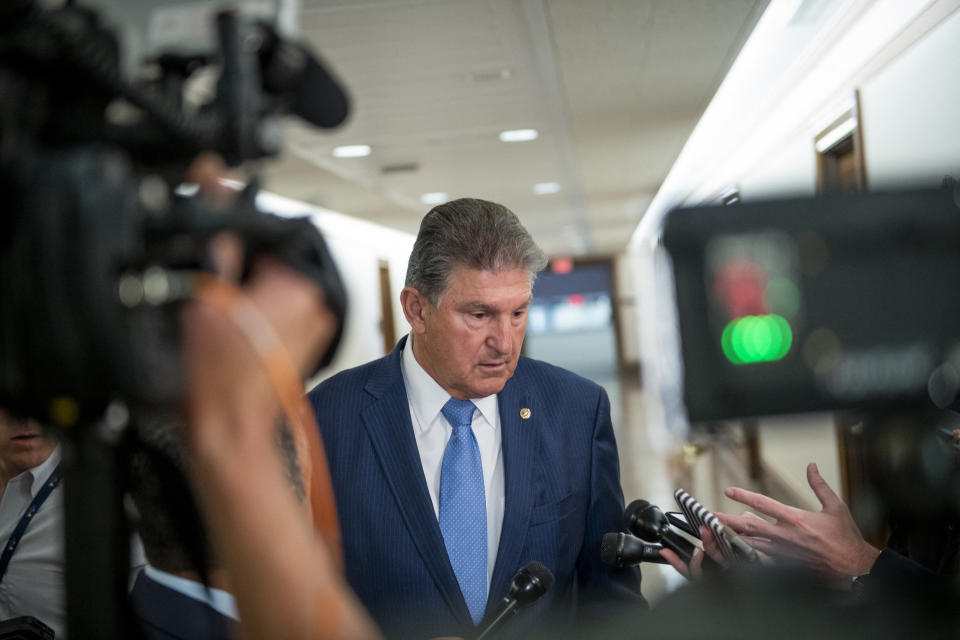As Dems Adopt $3.5 Trillion Budget Blueprint, Manchin Fires a Warning Shot

The Senate adopted Democrats’ $3.5 trillion budget resolution just before 4 a.m. Wednesday morning in a 50-49 vote along party lines. Republicans uniformly voted against the blueprint that could open the door to a massive spending package calling for an expansion of Medicare and federal safety net programs along with sweeping changes to the country’s child care, education and climate change efforts. Those changes would be financed at least in part by tax hikes on the wealthy and corporations.
“Senate Democrats just took a massive step towards restoring the middle class in the 21st Century, and giving more Americans the chance to get there,” Senate Majority Leader Chuck Schumer (D-NY) said after the vote. “The Democratic budget will bring a generational transformation for how our economy works for average Americans.”
Wednesday’s vote followed some 14 hours of debate over Democrats’ plans and their potential effects on the federal budget deficit — and that debate will still rage on now that the budget blueprint has been passed.
“This was one of the most significant legislative days we’ve had in a long time here in the United States Senate, but we still have a long road to travel,” Schumer told reporters Wednesday, a giant cup of coffee by his side. “It’s as if we caught a nice long pass at midfield, but we still have 50 yards to go before we score a touchdown.”
Democrats must still put together the full reconciliation package outlined in their resolution instructions. Individual committees will produce those more detailed legislative plans that will then get stitched together into a massive omnibus bill that is voted on by both the House and Senate. Schumer said he wants the reconciliation bill written by September 15, but the process will be rife with challenges to maintaining the party unity Democrats will need to bypass any Senate Republican filibuster.
Manchin being Manchin: Case in point: Sen. Joe Manchin (D-WV), a critical swing vote in the evenly divided Senate, reiterated in a lengthy statement Wednesday that while he voted for the budget resolution he still has “serious concerns” about the path of the economy and the cost of the Democratic plan.
Here’s Manchin’s argument, which echoes those made by Republicans:
“Over the past year, Congress has injected more than $5 trillion of stimulus into the American economy – more than any time since World War II – to respond to the pandemic. The challenge we now face is different: millions of jobs remain unfilled across the country and rising inflation rates are now an unavoidable tax on the wages and income of every American. These are not indications of an economy that requires trillions in additional spending. Every elected leader is chosen to make difficult decisions. Adding trillions of dollars more to nearly $29 trillion of national debt, without any consideration of the negative effects on our children and grandchildren, is one of those decisions that has become far too easy in Washington.
“Given the current state of the economic recovery, it is simply irresponsible to continue spending at levels more suited to respond to a Great Depression or Great Recession – not an economy that is on the verge of overheating. More importantly, I firmly believe that continuing to spend at irresponsible levels puts at risk our nation’s ability to respond to the unforeseen crises our country could face. I urge my colleagues to seriously consider this reality as this budget process unfolds in the coming weeks and months.”
Sen. Kyrsten Sinema (D-AZ) has also said she’s troubled by the $3.5 trillion price tag of the reconciliation package.
Other Democrats have said that their new spending will be paid for, and they’ve countered inflation concerns by pointing out that the trillions of dollars in their reconciliation bill would be spread out over many years, lessening the chance of “overheating” that Manchin still cited. “If your primary concern right now is the cost of living, you should support this plan,” President Joe Biden said Wednesday. “A vote against this plan is vote against lowering the cost of health care, housing, child care, elder care and prescription drugs for American families.”
At the other end of the Democratic spectrum from Manchin, progressives say that the $1 trillion bipartisan infrastructure bill alone falls far short of what the country needs, and they insist that they’ll only pass it if it’s accompanied by the larger package. The Congressional Progressive Caucus said Tuesday that a survey of its 96 members found that most will not vote for the bipartisan bill until the Senate passes a “robust” reconciliation bill.
“Our caucus is clear: The bipartisan bill will only be passed if a package of social, human, and climate infrastructure — reflecting long-standing Democratic priorities — is passed simultaneously through budget reconciliation,” Rep. Pramila Jayapal (D-WA), chair of the caucus, said in a statement.
House Speaker Nancy Pelosi has also linked the two bills. She confirmed to her caucus on a call Wednesday that she won’t bring the bipartisan infrastructure bill up for a House vote this month, rejecting calls from moderates to schedule a quick vote. “The president has said he’s all for the bipartisan approach ... bravo! That’s progress, but it ain’t the whole vision,” Pelosi reportedly said on the call. “The votes in the House and Senate depend on us having both bills.”
The bottom line: President Joe Biden’s economic agenda has scored a couple of major wins this week, but Democratic divisions may be the biggest threat to cementing those victories.